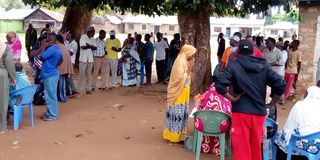
ODM leader Raila Odinga (left) and Deputy President William Ruto.
| File | Nation Media GroupPolitics
Premium
Raila, DP Ruto scheme to block defections
Losers in party primaries will be time-barred from running as independent candidates if party chiefs exploit new deadlines to curb defections.
The decision by the Independent Electoral and Boundaries Commission (IEBC) to push the deadline for primaries to May 26, 2022 allows parties to hold nominations long after the deadline for politicians intending to vie as independents to resign from parties.
IEBC had initially fixed April 16 to April 22, 2022 as the period for holding party primaries. This would have allowed nomination losers to quit their parties and still run as independents—anyone intending to vie as an independent has until May 9 to cease being a party member.
According to the initial timelines, the parties had between April 25 and May 6 to resolve nomination disputes, which meant losers had a seven-day window to know the fate of their appeals and still beat the independent deadline.

ODM party primaries voting underway at Jogoo polling station on October 1, 2020.
But now, the elections body has allowed parties more time for nominations following a push by Mr Raila Odinga, leader of the Orange Democratic Movement (ODM), meaning, party leaders could block last-minute defections.
Under IEBC’s election plans, independent candidates are required to submit their symbols, letters of intent to vie and clearance from the Registrar of Political Parties by May 2, 2022.
The law stipulates that an independent candidate must not be a member of a political party at least three months to the date of the election. This implies that politicians who wish to run as independents, must resign from political parties before May 9, 2022—exactly three months to the August 9, 2022 General Election.
Automatically barred
Therefore, if a political party decides to hold its primaries after this date, those who fail to clinch tickets will automatically be barred from running as independents.
Among leading presidential contenders, pushing back primaries in their strongholds, where getting the party ticket is as good as being elected, is alluring as it blocks defections. For Deputy President William Ruto and Mr Odinga, for example, this will be especially useful in regions where party tickets have attracted intense competition.
In counties like Uasin Gishu, Nandi, Bomet, Kirinyaga and Murang’a, the DP faces an uphill task balancing the interests of bigwigs angling for various seats. For Mr Odinga, the battles in Homa Bay, Mombasa, Siaya, Kisumu, Kisii and Kilifi counties present a similar headache.
The fear that independents are a serious challenge to established political parties is not far-fetched.
In 2017, a record 4,002 independent candidates, compared to just 350 in 2013, presented themselves for election, a number many analysts say could rise significantly in 2022.
“The high number of independent candidates was a direct result of Kenya’s chaotic primaries process and the fact that nearly 20 per cent of incumbents and party candidates failed to win their political party nominations,” an analysis of the 2017 election by the US-based Carter Centre concluded. “Prohibitions on party hopping, or candidates switching parties after they lost their primary race, contributed to this dynamic.”
If independent candidates were a party, their representation in the National Assembly, 13, would be the fourth largest after Jubilee, ODM and Wiper. They outnumber those that political heavyweights Musalia Mudavadi’s ANC (12) and Moses Wetang’ula’s Ford Kenya (10) have in their fold.
Of the 13, seven failed to win their party’s nomination but triumphed as independents in regions seen as Jubilee or Nasa strongholds. These are Mohamed Ali (Nyali), Shakeel Shabbir (Kisumu East), John Paul Mwirigi (Igembe South), Kawira Mwangaza (Meru), Patrick Wainaina (Thika Town), Janet Sitienei (Turbo) and Peter Masara (Suna West).
Mr Ali beat Mombasa Governor Ali Hassan Joho’s brother Said Abdalla Saido whom he had run against in the disputed ODM primaries, garnering 26,798 votes against Mr Saido’s16,473.
Mr Masara recaptured his Suna West seat after quitting ODM—which enjoys massive following in the area—and contested as an independent.
Mr Wainaina surprised many when he beat Ms Alice Ng’ang’a of Jubilee, garnering 58,286 votes against Ms Ng’ang’a’s 52,115.
In Kenya’s 1,450 wards, independent candidates who won in the 2017 polls were the third largest group—a staggering 109— beaten only by Jubilee’s 582 and ODM’s 339.
Laikipia Governor Ndiritu Muriithi and Isiolo’s county boss Mohamed Kuti were elected as independents, while Kirinyaga Senator Charles Kibiru is flying the independent flag in the Senate.
The Registrar of Political Parties, Ms Anne Nderitu, last month advised parties to conduct primaries on the same day to limit the window for defections.
“Over 100 people have switched from one political party to vie as independent candidates since 2017. This has weakened the political parties,” she said at a meeting in Nairobi. “Maybe parties should consider conducting nomination at the same time to limit defection.”





